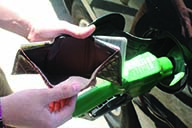
This is the first in a three-part series exploring effects rising gas prices have on students, Murray State and the community.
Students, like the rest of the nation, have started to notice the rise in gas prices.
David Brasfield, professor of economics, said gas prices have risen because of their connection to the international market.
“Obviously, gas prices are tied to crude oil prices, not completely but crude oil prices have been going up largely because of the issues in the Middle East between Iran and its neighbors,” he said. “As long as these contentious times remain, then we’ll probably being seeing, let’s call it, a ‘risk premium’ in the price of oil.”
Brasfield said he has also heard rumors of talks between France and the United States to release the strategic oil reserve in France. Though this would help bring gas prices down, it is only a temporary solution.
In the near future, Brasfield said he does not believe gas prices will decrease. However, farther down the road, it is a possibility.
Don Robertson, vice president of Student Affairs, said there were several factors that could affect students. Commuter students’ ability to afford the higher prices is one of the main concerns, Robertson said.
“Will that prompt students to go to school closer to home?” he asked.
Robertson said the University could regard the higher prices in a positive light.
“In that regard, it could be a positive if it resulting in more people deciding to live on campus, which, from our estimation, freshmen and sophomores benefit from living on campus,” he said.
Darrien Shelton, senior from Mayfield, Ky., said he has watched gas prices rise since he was a child.
“When I was 12 and scared of the very thought of getting behind the wheel of a car, gas was near $1.50 a gallon,” he said. “I’m now 23 and gas is $3.90 a gallon.”
He said it is the inconsistency of the prices that is aggravating.
“It’s the way and how quickly the prices rise; gas could be $3 a gallon one day, and something happen over seas and the prices of gas instantly rise .50 cents or more,” he said. “It’s ridiculous.”
As a student, gas prices rising can be a real concern, Shelton said.
“Gas prices are the last thing we need to be worrying about, but it’s a reality,” he said.
Shelton said he drives only in mandatory situations and rare trips home.
In protest of the high gas prices, students and community members are rallying together and striking.
A flier is floating around college universities across America and is being shared on social media sites such as Facebook encouraging people to refrain from pumping gas on April 15.
The flier states that, in 1997 there was a “gas out” conducted nationwide in protest of high gas prices. After this strike, gas prices dropped 30 cents a gallon over night.
If all users did not pump gas on April 15, it would take approximately $2.3 billion out of the oil companies, the flier states.
Kayley Emerson, sophomore from Bells, Tenn., said she found the flier on Facebook after a friend of hers who attends the University of Tennessee at Martin had posted it to his profile.
Contact Russell at hrussell@
murraystate.edu.